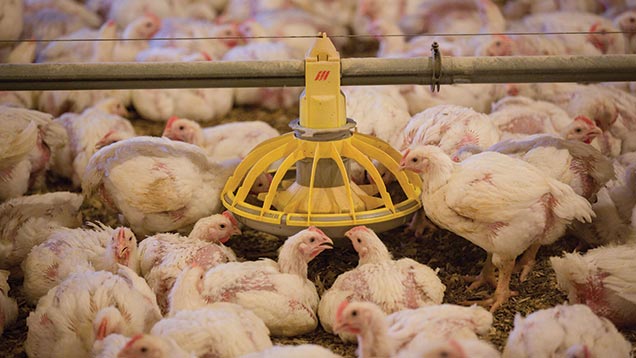How to get compensation if your feed’s not right
 © Tim Scrivener
© Tim Scrivener Dodgy feed is rare but not unheard of on poultry farms, as Derek Walsh of solicitors Thrings explains.
An unexplained drop in bird weight in a broiler flock, or fewer, poorer quality eggs on a layer unit, are serious causes for concern for any poultry producer.
There can be many reasons, such as environmental factors or viral infections, but feed problems have also been associated with substantial losses.
If that is the case, in order for a claim to have any prospect of success, it must be proven that the feed was in some way defective. This is ultimately a matter for experts to determine upon consideration of the formulation and through laboratory analysis. Assuming there is no direct contamination, the key issue is whether the nutritional and ingredient levels which the feed should contain have been achieved in the production process.
All too often, however, this can be difficult to prove. But if it can be established that the feed was defective, then the feed supplier may have to pay compensation for losses suffered, subject to the terms of the contract and the usual rules on mitigating losses.
Points to consider
- It is likely that the deal to buy the feed will be done on the seller’s terms and conditions which are likely to include exclusion or limitation of liability clauses. You will need advice on whether those are enforceable. Consider, too, your supply contract – if a problem has now arisen with your flock, what are your obligations to the purchaser and have you got contingency plans to meet that eventuality?
- Keep copies of all documents provided by the feed company, including details of formulations and delivery notes.
- Proving the feed is defective can only be established on analysis, therefore it is essential that samples from each load are routinely kept and safely stored in the correct conditions.
- Veterinary advice will in all likelihood be sought as soon as there are signs of a problem and your vet can discount viral or other infections, as the case may be, and provide a letter or statement if required in due course.
- Flock health records can be useful to compare any drop in production during the “problem” period with another “trouble-free” period. If sister flock information is available, this may also be helpful and can be used to disprove allegations of poor management.
- If a problem does arise, keep a diary of key events, including conversations with the feed company – make a note during or as soon as possible after those conversations and if any concessions are made confirm them in writing.
- Check your insurance cover – is it sufficient to cover your losses in the event that problems arise? Is there legal expenses cover included and up to a level which any claim is realistically going to be?
Of course, many farmers will have a long-term trading relationship with their feed supplier and if you can show the feed was defective, settlement can often be reached by negotiation without having to issue legal proceedings.
Integrator contracts
The position with integrator contracts – where the company contracts out the growing of the birds to independent growers and generally provides the birds, feed, medication and technical/management advice – is somewhat different and the resolution of the dispute will ultimately turn on the terms of the contract.
Understanding the contract at the outset is essential as it will define the obligations and responsibilities of each party. Although intended to be comprehensive, the contract is unlikely to cover every eventuality.
It will usually be drafted by the integrator and legal advice should be sought before entering into any agreement so that it is fully understood – in particular in terms of specific management practices required, payment calculations, length of contract and any notice periods.
As payments may be directly tied to feed conversion, defective feed can directly affect the level of payment you receive. Under the agreement, the integrator’s obligations should also be set out and supplying defective feed may amount to a breach of contract. Conversely, the contract may provide a mechanism for dealing with defective feed, or exclude liability altogether.
The precise wording of the contract will need to be reviewed and the practical issues above, with regard to establishing any breach, need to be considered also.
In many cases, and depending on the relationship between the grower and the integrator, a negotiated solution can be found – but that may only come about after professional advice on the parties’ respective legal positions is sought.
Key points
- Know your contract, whether with your feed supplier or integrator
- Retain feed samples and store them safely
- Keep a diary of key events including important conversations
